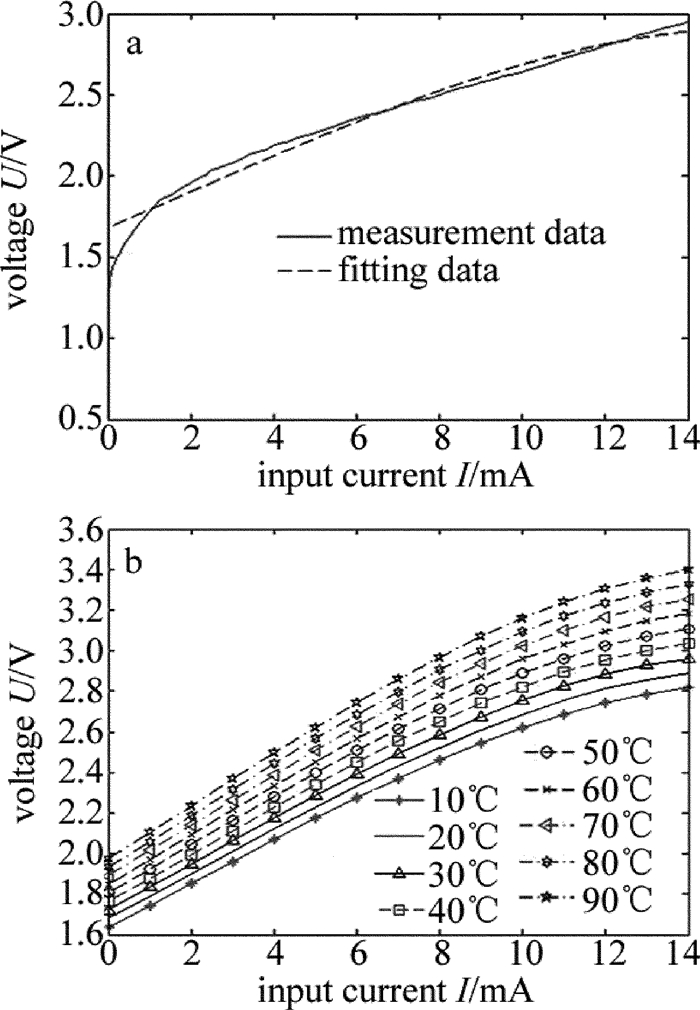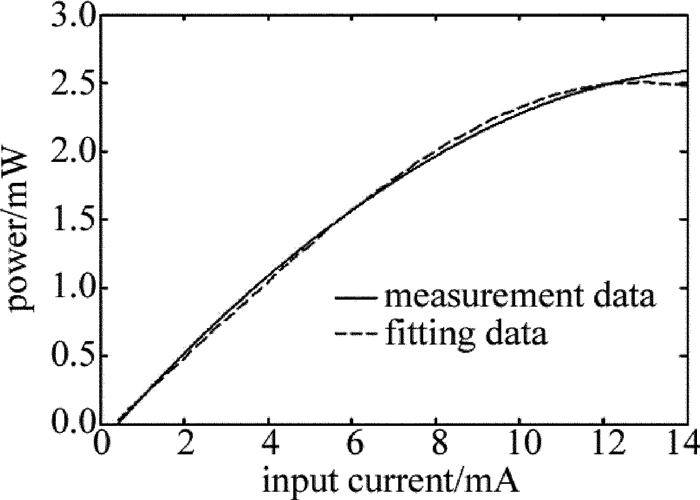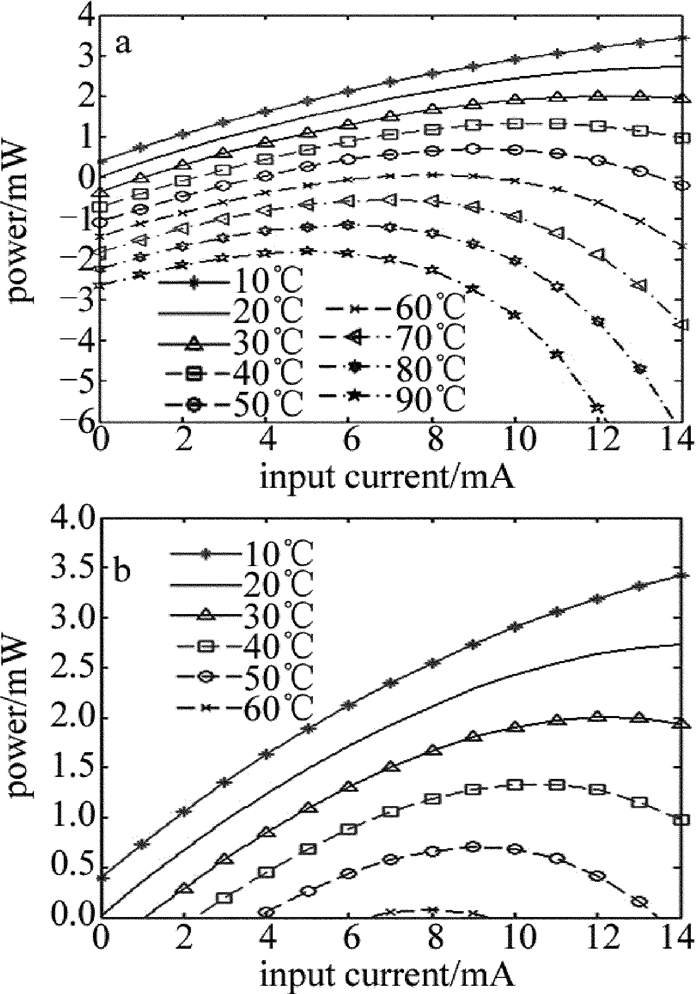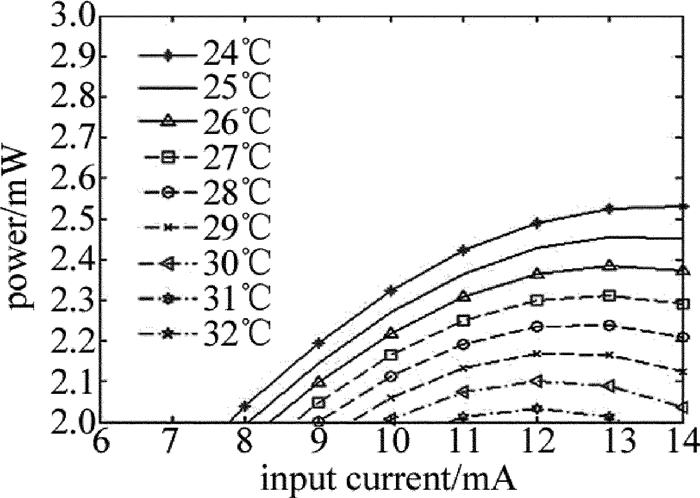Study on temperature characteristics of vertical cavity surface emitting lasers
-
摘要: 为了研究垂直腔面发射激光器(VCSEL)输出的光功率与器件温度的关系,确定用户可正常使用网络的温度范围,采用输出光功率与工作电流关系(P-I)模型进行了理论分析及实验验证,并通过简化模型参量及引入电压与电流关系(U-I)特性曲线来优化模型。采用了Levenberg-Marquardt(LM)算法来实现模型参量的求解,对比20℃下的测量数据与拟合数据的相似度,预测得到不同温度下的P-I特性曲线数据。结果表明,在固定温度下,输出光功率随着驱动电流的增加先增后减;在固定的驱动电流下,输出光功率随着温度增加而减小;要保证用户正常上网,电机房里VCSEL激光器工作的环境温度最多不能高于31℃。
-
关键词:
- 激光器 /
- 温度特性 /
- 输出光功率与工作电流关系(P-I) /
- 垂直腔面发射激光器 /
- Levenberg-Marquardt算法
Abstract: In order to study relationship between output power and device temperature of a vertical cavity surface emitting laser (VCSEL)and determine the temperature range at which the user can use the network normally, the relationshipmodel between output power and working current (P-I) was used to do theoretical analysis and experimental verification. Then the model was optimized by simplifying the parameters and introducing voltage-current (U-I) relationship curve. The model parameters were obtained by means of Levenberg-Marquardt (LM) algorithm. The P-I characteristic curve data at different temperatures were predicted by comparing the similarity between measured data and fitting data at 20℃.The results show that, at a fixed temperature, optical output power increasesat first and then decreaseswith the increaseof driving current. At the fixed driving current, optical output power decreaseswith the increaseof temperature. To ensure the normal Internet using, room temperature of VCSEL laserscan notbe higher than 31℃. -
引言
激光信号具有远高于电信号传输速率的特点,更适合于未来高速率的传输网络[1-3]。激光器作为光纤通信系统的核心器件是系统仿真中考虑的一个重要因素。垂直腔面发射激光器(vertical cavity surface emitting laser, VCSEL)具有使用简单、功耗较低等特点,目前广泛应用于光纤通信和光信号处理领域[4-5]。VCSEL激光器输出的光功率与器件的温度相关,当器件温度改变后,激光器输出的光功率也会相应发生变化[6-8]。准确地分析激光器的温度特性可以保证激光器在合理的外界环境温度范围内使用[9]。
国内外很多学者研究仿真温度对VCSEL性能的影响,并建立了大量的模型。NAKWASKI建立了2维热效应模型[10-11]。YU等人建立用于单模模拟的VCSEL的速率方程模型[12]。MOROZOV等人考虑多模行为的速率方程模型[13]。SU等人建立的静态热特性模拟的温度相关模型[14]。
本文中通过建立光功率与工作电流关系(P-I)模型,并简化模型参量及引入电压电流关系(U-I)特性曲线来优化分析模型。使用Levenberg-Marquardt(LM)算法来实现模型的求解。对比分析20℃下的测量数据与拟合数据的相似度,进一步来预测不同温度下的P-I特性曲线,并分析用户可正常使用网络的温度范围。
1. VCSEL的P-I模型及优化
1.1 P-I模型建立
VCSEL的输出光功率P0和外部驱动电流I满足可以用下式来表示, 这里P0与I的建模关系称为P-I建模[15]:
P0=η(T)[I−Ith(N,T)] (1) 式中, P0表示激光器输出的光功率;I表示注入到激光器的外部驱动电流,包含外部加载的偏置电流Ib和信号电流,在没有信号输入时驱动电流为偏置电流Ib;η(T)是P-I曲线的斜率,其大小与温度T相关,从能量转换角度看,斜率相当于转换效率:斜率越高,相同电流I对应的输出光功率越高,那么相同电能可转换的光能越多; Ith(N, T)表示阈值电流,其大小主要和载流子数N及温度T相关。
为简化(1)式的表达,可以假设转换效率η(T)受温度影响较小[16],即η(T)近似于常数η。同时假设忽略空间烧孔效应的影响。阈值电流可以表示为只与温度相关的函数[14],如下式所示:
Ith(N,T)=Ith,0+Ioff(T) (2) 式中,Ith, 0为常数,Ioff(T)是与温度相关的经验热偏置电流,该电流随激光器的变化而变化。Ioff(T)可以由温度的多项式表示:
Ioff(T)=∞∑n=0anTn (3) 式中,an是多项式的参量,n表示阶数。
此时(1)式可以表示为:
P0=η(I−Ith,0−∞∑n=0anTn) (4) 式中,η(T)表示转换效率,是P-I曲线的斜率。本文中假设η(T)受温度影响较小,η(T)近似于常数η,模型求解中,η同样为待求参量。温度T受环境温度T0以及自身的温度影响,自身的温度与器件产生的瞬时功率Pi相关,瞬时功率Pi=UI,即受U-I(电压-电流)特性影响:
T=T0+(UI−P0)Rth−τthdTdt (5) 式中,Rth表示VCSEL热阻抗;τth表示热时间常数;T0代表环境温度;此处I为偏置电流Ib,U表示输入电压。
假设温度不发生变化时,(5)式后面微分项可忽略不计。结合(2)式~(5)式可以得到P0和I的隐式关系:
P0=η{I−Ith,0−∞∑n=0an[T0+Rth(UI−P0)]n} (6) 1.2 P-I模型参量的优化
模型的参量多少决定该模型整体的运行速度。参量太多会使得模型计算量增大,并且容易产生过拟。所以适当地优化参量个数在优化网络的同时会提高模型的计算精度。
将(4)式中的高次多项式展开可得:
P0=η(I−Ith,0−a0−a1T−a2T2−a3T3−a4T4−⋯) (7) 根据(7)式可以看出,参量Ith, 0(Ith, 0为常数,模型求解中Ith, 0为待求参量)和参量a0皆为1阶常量,这里可以将这两个参量合并为一个参量, 即可以将(3)式优化为:
Ioff(T)=∞∑n=0anTn,(n=1,2,3,⋯) (8) 故而可以在模型的整体计算上减少一个参量。随着n的增大,的值越来越小,并趋于0。这里假设n>4时,趋近为0, 所以取n=1, 2, 3, 4。
此时,P0和I的隐式关系为:
P0=η(I−Ith,0−a1T−a2T2−a3T3−a4T4) (9) 式中,T=T0+(UI-P0)Rth。
1.3 VCSEL的U-I特性曲线
温度T受外界环境温度T0和自身的温度影响,自身的温度与器件产生的瞬时功率Pi相关,瞬时功率Pi=UI相关,即受电压-电流(U-I)特性影响:
T=T0+(UI−P0)Rth (10) 电压的变化关系和VCSEL的特性相关。为了简化模型,可以认为电压主要受温度和电流的影响,即:
U=f(I,T0) (11) 在实际应用中,电压会随着温度和电流的变化而变化,所以可以用多项式来拟合电压U的输出[6],如下式所示:
U=(n∑i=0biTi0)×(m∑j=0cjIj) (12) 式中,bi和cj为多项式的拟合参量;n,m为多项式的拟合的阶数,0≤i≤n,0≤j≤m。利用(12)式,根据在20℃的环境温度下得到的实验数据U及I,拟合其U-I特性曲线。在20℃下,当n=2,m=4时, U-I特性曲线与实测数据的对比图如图 1所示。
图 1中的横坐标代表驱动电流,纵坐标代表电压。图 1a中的实线是温度为20℃时的实测U-I数据,虚线是经过(12)式且n=2,m=4时拟合后的曲线。从图 1a可以看出, 拟合的数据可以较好地反映实际数据的分布。图 1b为根据拟合参量求得的在10℃,20℃,30℃,…,90℃温度下的U-I特性曲线。通过图 1b可以看出:(1)在固定温度下随着驱动电流的增加,电压也会随之增加;(2)在固定的驱动电流下,随着温度的增加,电压也会随之增加。
此时,模型整体修正为式:
P0=η(I−Ith,0−a1T−a2T2−a3T3−a4T4−⋯) (13) 式中,
T=T0+[I(n∑i=0biTi0)(m∑j=0cjIj)−P0]Rth (14) 2. 基于LM算法的模型求解
LM算法结合了Gaussian-Newton法和梯度下降法,利用标准值优化初值,是一种快速算法。具有稳定性强和快速收敛等优点,是快速有效求解目标函数的常用方法[17]。所以选择LM算法来求解(13)式。
在LM算法中,存在如下关系式[18]:
{\mathit{\boldsymbol{u}}_{k + 1}} = {\mathit{\boldsymbol{u}}_k} + \Delta \mathit{\boldsymbol{u}} (15) 式中,uk为第k次迭代时的输入向量,uk+1为第k+1次迭代时的输入向量,Δu为两次迭代时向量的变化量。此处u =[η, Ith, 0, Rth, a1, a2, a3, a4]是7维向量,是所需要求解的参量。
对于牛顿法有:
\Delta \mathit{\boldsymbol{u}} = - {\left[ {{\nabla ^2}\mathit{\boldsymbol{E}}\left( \mathit{\boldsymbol{u}} \right)} \right]^{ - 1}}\nabla \mathit{\boldsymbol{E}}\left( \mathit{\boldsymbol{u}} \right) (16) \mathit{\boldsymbol{E}}\left( \mathit{\boldsymbol{u}} \right) = \frac{1}{2}\sum\limits_{i = 1}^N {\mathit{\boldsymbol{e}}_i^2\left( \mathit{\boldsymbol{u}} \right)} = \frac{1}{2}\sum\limits_{i = 1}^N {{{\left( {{P_0} - P} \right)}^2}} (17) 式中,E (u)是误差指数函数,▽ E(u)为梯度,▽2 E(u)为Hessian矩阵,e (u)为期望功率和实际功率误差误差向量,P0为期望输出功率值,P为实际输出功率值。在此处,P是已知的,由(14)式得到关于未知数η, Ith, 0, Rth, a1, a2, a3, a4的隐函数关系式。
对于Hessian矩阵:
{\nabla ^2}\mathit{\boldsymbol{E}}\left( \mathit{\boldsymbol{u}} \right) = {\left[ {\mathit{\boldsymbol{A}}\left( \mathit{\boldsymbol{u}} \right)} \right]^{\rm{T}}}\mathit{\boldsymbol{e}}\left( \mathit{\boldsymbol{u}} \right) + \mathit{\boldsymbol{S}}\left( \mathit{\boldsymbol{u}} \right) (18) \mathit{\boldsymbol{S}}\left( \mathit{\boldsymbol{u}} \right) = \sum\limits_{i = 1}^N {{\mathit{\boldsymbol{e}}_i}\left( \mathit{\boldsymbol{u}} \right){\nabla ^2}{\mathit{\boldsymbol{e}}_i}\left( \mathit{\boldsymbol{u}} \right)} (19) 式中,A (u)为Jacobian矩阵。当目标接近极值时,S (u)很小,可忽略不计,此时:
{\nabla ^2}\mathit{\boldsymbol{E}}\left( \mathit{\boldsymbol{u}} \right) \approx {\left[ {\mathit{\boldsymbol{A}}\left( \mathit{\boldsymbol{u}} \right)} \right]^{\rm{T}}}\mathit{\boldsymbol{e}}\left( \mathit{\boldsymbol{u}} \right) (20) 对Gaussian-Newton法:
{\nabla ^2}\mathit{\boldsymbol{E}}\left( \mathit{\boldsymbol{u}} \right) \approx {\left[ {\mathit{\boldsymbol{A}}\left( \mathit{\boldsymbol{u}} \right)} \right]^{\rm{T}}}\mathit{\boldsymbol{A}}\left( \mathit{\boldsymbol{u}} \right) (21) 迭代过程中,对E (u)的Hessian矩阵无法求逆时,需对E (u)的Hessian矩阵进行变形:
{\nabla ^2}\mathit{\boldsymbol{E}}\left( \mathit{\boldsymbol{u}} \right) \approx {\left[ {\mathit{\boldsymbol{A}}\left( \mathit{\boldsymbol{u}} \right)} \right]^{\rm{T}}}\mathit{\boldsymbol{A}}\left( \mathit{\boldsymbol{u}} \right) + \mu \mathit{\boldsymbol{I}}\left( \mathit{\boldsymbol{u}} \right) (22) 式中,I为单位矩阵;μ为阻尼系数,且μ>0为常数。故有:
\nabla \mathit{\boldsymbol{u}} = - {\left( {\mathit{\boldsymbol{A}}_k^{\rm{T}}{\mathit{\boldsymbol{A}}_k} + \mu \mathit{\boldsymbol{I}}} \right)^{ - 1}}\mathit{\boldsymbol{A}}_k^{\rm{T}}{\mathit{\boldsymbol{e}}_k} (23) {\mathit{\boldsymbol{u}}_{k + 1}} = {\mathit{\boldsymbol{u}}_k} - {\left( {\mathit{\boldsymbol{A}}_k^{\rm{T}}{\mathit{\boldsymbol{A}}_k} + \mu \mathit{\boldsymbol{I}}} \right)^{ - 1}}\mathit{\boldsymbol{A}}_k^{\rm{T}}{\mathit{\boldsymbol{e}}_k} (24) 上面(15)式~(24)式即为LM算法的表达式,ek表示e (uk)。每次迭代时重新计算误差函数E(uk+1),若其小于E(uk),则保留此次迭代结果,减小阻尼系数μ来提高计算精度,并继续进行迭代,令μ=μ/β(β>1,β为大于1的常数);反之则增大阻尼系数μ后重新计算,令μ=μ·β,直到满足E(uk+1) < E(uk)时,停止增大μ。
3. 实验结果及分析
在20℃的环境温度下得到的输出光功率P0和外部驱动电流I的实验数据,根据改进的P-I模型,使用LM算法来求解模型,拟合P-I模型曲线。并给出不同温度情况下(10℃,20℃,30℃,…,90℃)P-I曲线的预测结果。
模型的初始值和最终模型求解出的参量值如表 1所示。
Table 1. The initial value and the solved value of the improved P-I modelparameter model solution value initial value unit η 0.4803 0.5 — Ith, 0 -0.0094 0.3×10-3 A Rth 2.873×103 2.873×103 K/W a1 -1.7363×10-4 -2.545×10-5 A/K a2 1.6608×10-6 2.908×10-7 A/K2 a3 -4.5594×10-9 -2.531×10-10 A/K3 a4 4.4282×10-12 1.022×10-12 A/K4 3.1 20℃时P-I曲线
图 2是温度为20℃时的实测数据与拟合数据的P-I曲线结果对比图。图 2中横坐标代表驱动电流,纵坐标代表光功率,其中实线为拟合数据、虚线为实测数据。从图 2中可以看出, 模型几乎可以拟合出实测数据的趋势,并且拟合曲线相对测试曲线更加平滑。
3.2 不同温度下P-I曲线
将模型求解的参量值η, Ith, 0, Rth, a1, a2, a3, a4代入(14)式, 并求解温度在10℃,20℃,30℃,…,90℃下的P-I曲线, 如图 3所示。图 3a表示完全按照模型拟合出的各P-I曲线,不考虑物理情况下光功率不能小于0。图 3b显示为光功率大于0时的P-I曲线。
由图 3a可以看出, 光功率随着温度和驱动电流变化的整体走势。同样在固定温度下,输出光功率随着驱动电流的增加先增后减;在固定的驱动电流下,输出光功率随着温度增加而减小。因为光功率不可能小于0,所以光功率小于0时都强制置为0。从图 3b可以看出, 当温度不大于60℃时才会有光功率输出。所以想要有光功率输出,则温度不能高于60℃。
目前假定电信机房里VCSEL激光器在直流输入且输出的平均光功率低于2mW时,用户的光猫无法检测到信号。分析图 3b,当温度为30℃时, 光功率在2mW左右浮动,所以细分位于30℃附近(24℃~32℃)的P-I曲线图,近一步精确地推测激光器正常工作的温度。
图 4显示了24℃~32℃温度时的P-I曲线。从图上可以看出,只有在光功率大于2mW时才能保证激光器被检测到,保证用户正常使用网络; 当温度大于31℃时,任何驱动电流下都不会有光功率大于2mW。所以要保证用户正常上网,电机房里VCSEL激光器工作的环境温度最多不能高于31℃。
4. 结论
主要研究了VCSEL的P-I模型的温度特性。首先通过对P-I模型进行建模,并通过简化参量及引入U-I特性曲线来优化分析模型。模型使用LM算法计算模型参量。根据在20℃下的实测数据,计算出模型的拟合参量, 最终在20℃下采用P-I模型拟合P-I曲线效果非常好,与实测的P-I曲线非常吻合。同时根据建立的模型对不同温度下的P-I曲线进行了分析,指出了用户可正常使用网络的温度范围。
-
Table 1 The initial value and the solved value of the improved P-I model
parameter model solution value initial value unit η 0.4803 0.5 — Ith, 0 -0.0094 0.3×10-3 A Rth 2.873×103 2.873×103 K/W a1 -1.7363×10-4 -2.545×10-5 A/K a2 1.6608×10-6 2.908×10-7 A/K2 a3 -4.5594×10-9 -2.531×10-10 A/K3 a4 4.4282×10-12 1.022×10-12 A/K4 -
[1] WANG H X, CHEN J D, CHANG T Y, et al. Reaserch of modudation characteristics of distributed feedback laser[J]. Laser Technology, 2017, 41(6):836-840(in Chinese).
[2] JIAN X H, HAN Zh L, DONG Zh L, et al. Status and selection of photoacoustic imaging exciting laser sources[J]. Laser Technology, 2017, 41(5):712-716(in Chinese). http://www.wanfangdata.com.cn/details/detail.do?_type=perio&id=jgjs201705019
[3] DUAN H. The response characteristics of semiconductor lasers based on rate equations[D]. Qinhuangdao: Yanshan University, 2010: 1-83(in Chinese).
[4] LI F L, CHEN J J. Polarization switch and bistability in long-wavelength vertical-cavity surface-emitting lasers[J].Laser Technology, 2015, 39(4):515-519(in Chinese). http://en.cnki.com.cn/Article_en/CJFDTOTAL-JGJS201504019.htm
[5] ZHANF P, YU W M, SONG Y R. Technology of SESAM mode-locked OP-VECSELs[J]. Laser Technology, 2007, 31(3):291-294(in Chinese). http://www.wanfangdata.com.cn/details/detail.do?_type=perio&id=jgjs200703001
[6] YU Ch Y. Numerical simulation and characteristic investigation of vertical-cavity surface-emitting lasers based on rate-equations[D].Beijing: Beijing University of Posts and Telecommunications, 2006: 1-79(in Chinese).
[7] MENA P V, MORIKUNI J J, HARTON A V. A simple rate-equation-based thermal vcsel model[J]. Journal of Lightwave Technology, 1999, 17(5):865-872. DOI: 10.1109/50.762905
[8] SALE T E, ROBERTS J S, DAVIDJ P R. Temperature effects in VCSEL's[J].Proceedings of the SPIE, 1997, 3003:100-110. DOI: 10.1117/12.271056
[9] LIANG F, GAO J J, TIAN X N. An improved thermal model for a VCSEL[J]. Chinese Journal of Semiconductors, 2007, 28(7):1125-1129(in Chinese). http://www.wanfangdata.com.cn/details/detail.do?_type=perio&id=bdtxb200707025
[10] NAKWASKI W.Thermal aspects of efficient operation of vertical ca-vity surface-emitting lasers[J]. Optical & Quantum Electronics, 1996, 28(4):335-352.
[11] QSINSKI M, NAKWASKI W.Thermal effects in vertical-cavity surface-emitting lasers[J]. International Journal of High Speed Electronics & Systems, 1994, 5(4):667-730. http://d.old.wanfangdata.com.cn/Periodical/bdtxb201802005
[12] YU S F, WONG W N, SHUM P, et al. Theoretical analysis of modulation response and second-order harmonic distortion in vertical ca-vity surface-emitting lasers[J]. IEEE Journal of Quantum Electronics, 1996, 32(12):2139-2147. DOI: 10.1109/3.544761
[13] MOROZOV J V N, NEFF J A, ZHOU H. Analysis of vertical-cavity surface-emitting laser multimode behavior[J]. IEEE Journal of Quantum Electronics, 1997, 33(6):980-988. DOI: 10.1109/3.585486
[14] SU Y, CHANG Y, CHEN X.Circuit model for studying temperature effects on vertical-cavity surface-emitting laser[C]//Lasers and Electro-Optics Society Meeting, 1996. New York, USA: IEEE, 2002, 1: 215-216.
[15] COLDREN L A, SCOTT J W, GEELS R S, et al. Modeling tempe-rature effects and spatial hole burning to optimizevertical-cavity surface[J]. IEEE Journal of Quantum Electronics, 1993, 29(5):1295-1308. DOI: 10.1109/3.236145
[16] MICHALZIK R, EBELING K J. Modeling and design of proton-implanted ultralow-threshold vertical-cavity laser diodes[J]. IEEE Journal of Quantum Electronics, 1993, 29(6):1963-1974. DOI: 10.1109/3.234459
[17] MIRZAEE H. Long-term prediction of chaotic time series with multi-step prediction horizons by a neural network with Levenberg-Marquardt learning algorithm[J]. Chaos, Solitons & Fractals, 2009, 41(4):1975-1979. http://www.wanfangdata.com.cn/details/detail.do?_type=perio&id=f688cc97912ab41d6ae320b4093ab694
[18] WANG B X. Research on LM optimization algorithm and neural network predictive control in nonlinear system[D]. Taiyuan: Taiyuan University of Technology, 2016: 1-85(in Chinese).
-
期刊类型引用(0)
其他类型引用(4)




 下载:
下载:


